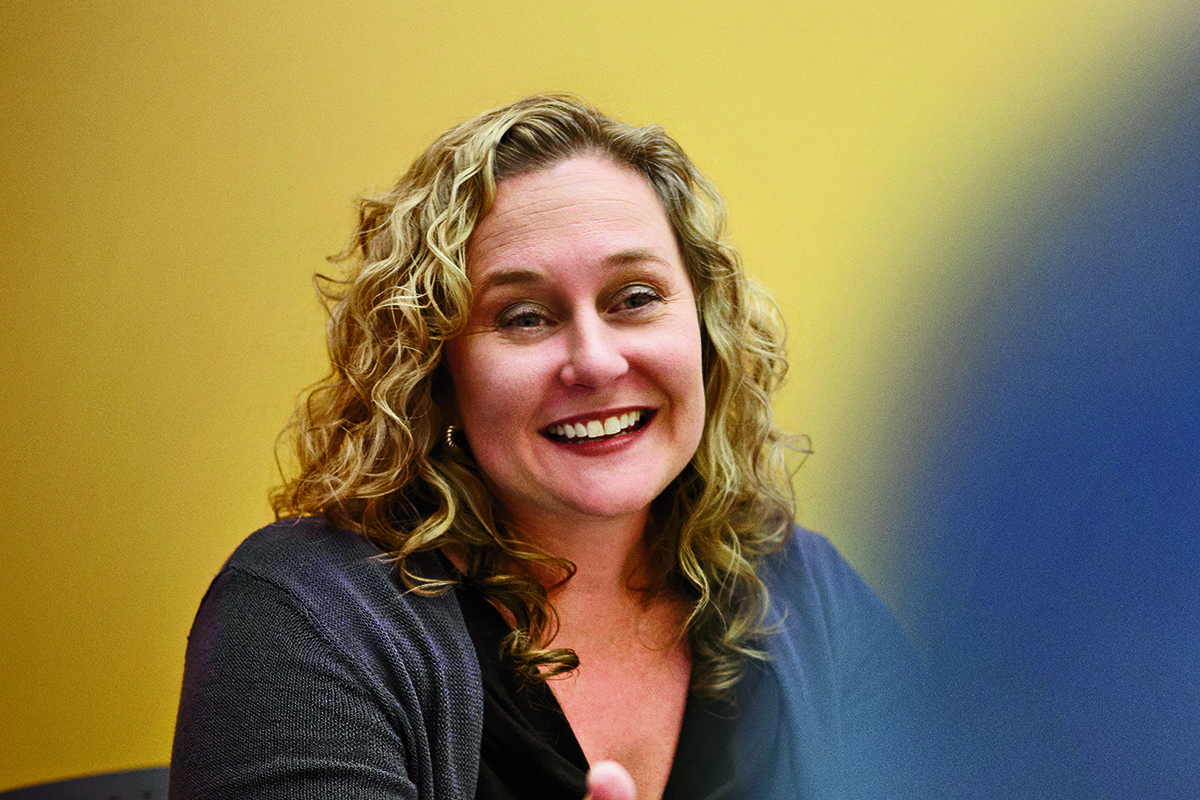A nearly 30-year-old mystery still stumps Amanda Moore McBride. Who donated the money to send her to the Presidential Classroom, an elite program in Washington, D.C., for the nation’s top high school students?
“I’m from a small town in Arkansas where everyone knows everyone else … but, to this day, we [my mom and I] still don’t know who helped me.”
Amanda Moore McBride
“I’m from a small town in Arkansas where everyone knows everyone else,” McBride says. “My mom and I would listen and watch for clues in church and around town, but, to this day, we still don’t know who helped me.”
Today, McBride, MSW ’95, PhD ’03, is an associate professor and associate dean for social work at the Brown School and director of the Richard A. Gephardt Institute for Public Service. But back then, McBride thought she might be a bank teller after high school graduation, just like her mom. No one in her immediate family had attended college; few had even finished high school. Her mother valued education but couldn’t afford a trip to the nation’s capital.
“When I got the letter saying I had been chosen, she told me, ‘This is more than I make in a month. I cannot afford to send you,’” McBride recalls. “She was a single mother. There was just no way.”
Two weeks later, McBride’s school principal called her to his office. A private donor had stepped forward to pay her tuition, airfare and lodging. “The principal said, ‘The donor believes you have potential and doesn’t want you to miss this opportunity,’” McBride says. “That person changed my life.”
And that person didn’t change just her life, but the lives of countless more who have been influenced by McBride’s research and teaching. A national leader, McBride has conducted important studies about civic engagement, volunteerism and service learning. She also has developed the Gephardt Institute’s Civic Scholars Program and, last year, served as co-chair of the university’s hosting of the Clinton Global Initiative University, which trains 1,200 students from across the world in civic action.
“I was just some little girl in this rural community and someone saw something in me,” McBride says. “But if you think of the thousands of students I have touched, just in my short academic career, that gift has led to a pretty good return on investment.”
That first gift was one of many that propelled McBride on her current path. Members of her hometown Kiwanis Club urged her to consider college and promised to help pay for it if she did. She chose Hendrix College, a private liberal arts school in Conway, Ark. During her senior year, McBride was in the midst of applying for graduate programs in psychology when she went to hear Bill Clinton’s presidential acceptance speech in Little Rock. She remembers everything about that night in November — the rain, the crowds, the fence she scaled to watch Clinton speak.
“He ran his campaign on opportunity and responsibility. I’m listening, thinking to myself, ‘What am I passionate about?’ And the answer was civic engagement, how people are connected to one another and how they are connected to politics,” she recalls. “So, I’m there on that fence, and I decide that I am dropping all of my applications to graduate psychology programs and I’m going into social work. I knew about Washington University and St. Louis — it’s Cardinal country down there. So, I decided, ‘Brown School and St. Louis, here I come.’”
She found Washington University generously supported its social work students. Some 98 percent of current Brown School students receive assistance. The Brown School awarded her the Frances Perkins Fellowship, named after the female appointee to the U.S. Cabinet. As Franklin Roosevelt’s labor secretary, Perkins established the forerunner to the AmeriCorps national service program, which is one of McBride’s major research interests. And then as a doctoral student, she earned the Richard Titmuss Fellowship. Titmuss studied why people give, another question McBride explores in her work. She is now struck by the serendipity of these scholarships, which opened the path of higher education for her.
“I didn’t start in 11th grade thinking that I would be a professor and study civic engagement. But when I look at this progression, it all makes sense.”
Amanda Moore McBride
“I didn’t start in 11th grade thinking that I would be a professor and study civic engagement,” McBride says. “But when I look at this progression, it all makes sense. I could never have afforded advanced education without all of the support I received along the way.”
Now it’s McBride’s turn. Her dual sense of gratitude to past benefactors and faith in her current students prompts her to give annually to scholarships at the university. She divides her gift between the Brown School for unrestricted support and the Gephardt Institute for stipends for civic learning opportunities.
“Call it paying it forward or paying it backward, but I’ve been gifted and I have a responsibility on two levels — to open as many doors as possible so students have access to education and to encourage their potential as civic leaders, who will in turn commit themselves to civic action,” McBride says. And like the donors who helped her, she is getting a substantial return on her investment. She credits university leaders for drawing the highest-caliber students and nurturing a campus culture that values service and community. “Together, we can make a difference in individual lives and in society overall,” she says.

